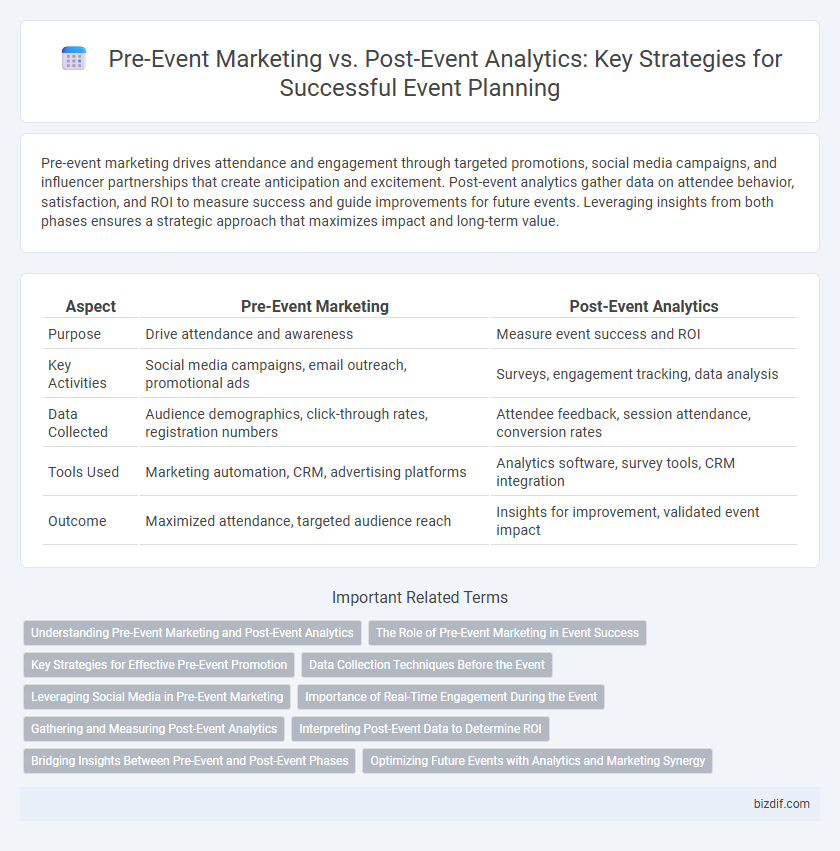Pre-event marketing drives attendance and engagement through targeted promotions, social media campaigns, and influencer partnerships that create anticipation and excitement. Post-event analytics gather data on attendee behavior, satisfaction, and ROI to measure success and guide improvements for future events. Leveraging insights from both phases ensures a strategic approach that maximizes impact and long-term value.
Table of Comparison
| Aspect | Pre-Event Marketing | Post-Event Analytics |
|---|---|---|
| Purpose | Drive attendance and awareness | Measure event success and ROI |
| Key Activities | Social media campaigns, email outreach, promotional ads | Surveys, engagement tracking, data analysis |
| Data Collected | Audience demographics, click-through rates, registration numbers | Attendee feedback, session attendance, conversion rates |
| Tools Used | Marketing automation, CRM, advertising platforms | Analytics software, survey tools, CRM integration |
| Outcome | Maximized attendance, targeted audience reach | Insights for improvement, validated event impact |
Understanding Pre-Event Marketing and Post-Event Analytics
Pre-event marketing leverages targeted campaigns, social media engagement, and email outreach to build anticipation and maximize attendance by analyzing audience demographics and preferences. Post-event analytics involves collecting data through surveys, social media metrics, and attendee feedback to evaluate event success, measure ROI, and identify areas for improvement. Understanding these strategies ensures optimized event planning by enhancing engagement before the event and driving continuous improvement afterward.
The Role of Pre-Event Marketing in Event Success
Pre-event marketing drives attendee engagement and maximizes event visibility by utilizing targeted campaigns across social media, email marketing, and influencer partnerships to build anticipation. Strategic pre-event promotions increase ticket sales and secure sponsor interest, establishing a solid foundation for event success. Effective pre-event marketing shapes audience expectations, directly impacting overall satisfaction and return on investment before post-event analytics are even analyzed.
Key Strategies for Effective Pre-Event Promotion
Targeted social media campaigns utilizing audience segmentation and influencer partnerships drive high engagement before events. Email marketing with personalized content and early bird offers boosts registration rates effectively. Leveraging data analytics to monitor campaign performance ensures optimization of key channels and messaging for maximum pre-event visibility.
Data Collection Techniques Before the Event
Pre-event marketing relies heavily on data collection techniques such as online surveys, social media engagement tracking, and email campaign analytics to understand target audience preferences and optimize promotional strategies. Utilizing tools like Google Analytics and customer segmentation software enhances the precision of lead generation and attendee profiling. These data-driven approaches enable event planners to tailor content, forecast attendance, and improve overall event success before the event even begins.
Leveraging Social Media in Pre-Event Marketing
Leveraging social media in pre-event marketing allows event planners to maximize reach and engagement by targeting specific demographics through platforms like Facebook, Instagram, and LinkedIn. Utilizing targeted ads, influencer partnerships, and interactive content creates buzz and drives early registrations. Social media insights collected pre-event also help tailor promotional strategies to optimize attendee turnout and enhance overall event success.
Importance of Real-Time Engagement During the Event
Real-time engagement during an event drives immediate audience interaction, fueling dynamic content sharing and enhancing attendee experience far beyond pre-event marketing efforts. Live feedback and instant analytics collected during the event empower organizers to make on-the-spot adjustments, maximizing impact and satisfaction. This active participation significantly amplifies post-event data quality, enabling more accurate and insightful post-event analytics to inform future planning strategies.
Gathering and Measuring Post-Event Analytics
Gathering and measuring post-event analytics involves collecting data such as attendee demographics, engagement metrics, and feedback through surveys and digital tracking tools. Key performance indicators (KPIs) include registration numbers, session attendance, social media interactions, and conversion rates, which help evaluate the event's success and ROI. Accurate analysis of this data informs future event strategies, improving targeting, content, and overall experience.
Interpreting Post-Event Data to Determine ROI
Interpreting post-event data is crucial for accurately determining ROI by analyzing key metrics such as attendee engagement, conversion rates, and overall satisfaction. Effective use of post-event analytics tools enables event planners to identify successful strategies and areas needing improvement, guiding future marketing efforts. Leveraging detailed data insights supports informed decision-making to optimize resource allocation and maximize event impact.
Bridging Insights Between Pre-Event and Post-Event Phases
Pre-event marketing strategies leverage audience segmentation, targeted messaging, and engagement metrics to maximize attendance and interest, setting a data-rich foundation for measurement. Post-event analytics analyze attendee feedback, engagement rates, and conversion metrics to evaluate event success and identify improvement areas. Bridging insights between these phases enables event planners to refine promotional tactics, optimize resource allocation, and enhance overall event ROI through data-driven decision-making.
Optimizing Future Events with Analytics and Marketing Synergy
Pre-event marketing drives audience engagement through targeted campaigns and personalized content, setting clear goals and expectations for the event. Post-event analytics provide actionable insights by evaluating attendee behavior, satisfaction levels, and ROI metrics, revealing strengths and areas for improvement. Integrating marketing efforts with data analytics creates a feedback loop that optimizes future event strategies, increasing attendance, boosting engagement, and maximizing overall event success.
Pre-event marketing vs Post-event analytics Infographic

 bizdif.com
bizdif.com